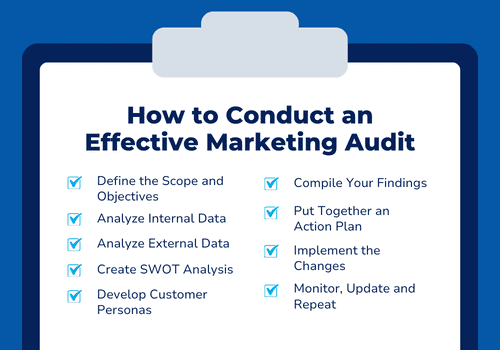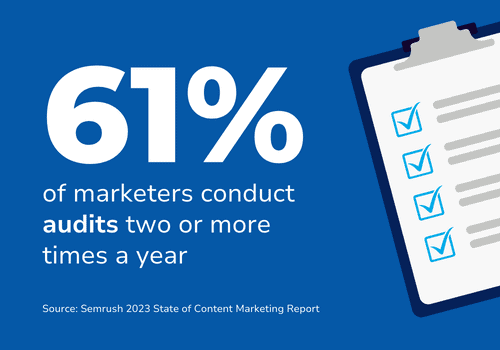Small businesses can’t afford to try a million different marketing efforts just to see what sticks.
You need a targeted approach that uses resources — both time and money — efficiently. But before you can start targeting anything, you need to know exactly where you should be aiming.
That’s why the foundation of any successful marketing strategy begins with a marketing audit.

As a small business owner, you know better than anyone that your enterprise faces unique marketing challenges. Limited resources, budget constraints, and ever-changing markets can make it difficult to effectively and consistently reach potential customers — let alone contend with competition that often includes larger businesses.
But by providing a detailed assessment of your current marketing strategies, a marketing audit becomes an invaluable source of actionable insights, guiding your business towards a more targeted and productive marketing plan.
In this article, we’ll examine the process and benefits of a marketing audit, and help your business lay the groundwork for a more efficient, effective and exceptional marketing strategy.
What is a Marketing Audit?
It’s easy to find marketing advice online. Just scroll through LinkedIn or do a couple of perfunctory Google searches, and you’re likely to come across a range of ideas for your business. While some of this advice might be great, none of it will be customized to your specific business and the market in which you operate.
Conducting a marketing audit, on the other hand, provides a comprehensive evaluation of your business’s current marketing strategy, including activities and outcomes. It goes beyond surface-level analysis, offering a deep dive into how a business promotes itself in comparison to its competitors and market trends.
Unlike the generic marketing solutions found online, a marketing audit is tailored to the specific needs and circumstances of your business. It provides actionable insights to reach real targets, helping businesses realize where they stand and how they can improve.
Here’s a breakdown of what a complete marketing audit can provide:
- Full Understanding of Current Marketing Efforts: It assesses the effectiveness of existing marketing strategies, campaigns, and activities, giving business owners a clear picture of what’s working and what’s not.
- Objective Insight and Analysis: An external marketing audit, in particular, offers unbiased perspectives, free from internal influences, leading to more accurate assessments.
- Identification of Strengths and Weaknesses: By pinpointing areas of success and areas needing improvement, businesses can allocate resources more effectively.
- Competitor Analysis: Understanding what competitors are doing successfully, and where they might be lacking, can offer strategic insights and opportunities for differentiation.
- Market Positioning and Trends: A marketing audit can reveal a business’s position in the market relative to competitors and identify emerging trends, allowing businesses to adapt and stay ahead.
- Enhanced Customer Understanding: By developing detailed customer personas and analyzing customer feedback, businesses can better understand their audience’s needs and preferences.
- Better Budget Awareness: A marketing audit can identify wasteful spending and suggest more efficient use of the marketing budget, an essential aspect for small businesses with limited resources.
- Adaptability to Changing Market Conditions: Regular marketing audits enable businesses to stay agile and responsive to changes in the market, customer behaviour, and technology.
The Necessity of Marketing Audits for Small Businesses
Earlier in this article, we highlighted the importance of marketing audits for small businesses.
If you look at the list of what a marketing audit provides above, all of the outcomes are especially useful for businesses that require a more targeted approach to their marketing plan — which is exactly what a small business needs to get the biggest bang for their buck with their marketing efforts.
Don’t let the term “audit” conjure up thoughts of paperwork and tax penalties. A marketing audit offers real benefits to local businesses:
- Optimized Resource Allocation: Small businesses often operate with limited budgets and resources. A marketing audit helps in identifying the most effective use of these resources, ensuring marketing budgets are optimized for maximum return on investment.
- Strategic Focus and Direction: A marketing audit provides small businesses with critical insights into your marketing plan, helping you focus on what works best and eliminate or improve areas that are underperforming.
- Competitive Edge in a Crowded Market: Small businesses face intense competition, from both local competitors and larger companies with more resources. A marketing audit can reveal competitive strengths and weaknesses, allowing small businesses to carve out a niche or capitalize on areas overlooked by competitors.
- Adaptability to Market Changes: Markets can change rapidly, and small businesses need to be agile to thrive in any environment. Regular marketing audits allow you to stay in tune with market trends, customer preferences, and technological advancements.
- Data-Driven Decision Making: A marketing audit delivers a lot of data that allows small businesses to move away from guesswork and begin making decisions based on analytics.
How to Conduct an Effective Marketing Audit
Now that we’ve established what a comprehensive marketing audit provides — and how it can be used by small businesses, in particular, to make more informed marketing decisions, utilize resources efficiently, and maintain a competitive edge — let’s look at what it actually takes to implement one for your business.

Here’s a step-by-step guide to conducting a successful marketing audit:
Step 1: Define the Scope and Objectives
Begin the marketing audit process by determining what aspects of your marketing you want to audit and what you hope to achieve.
- Decide whether to audit all marketing activities or focus on specific areas like digital marketing, brand messaging, or customer engagement.
- Consider what you primarily want to achieve with a marketing audit, such as improving ROI, increasing customer reach, or enhancing brand positioning.
Step 2: Collect and Analyze Internal Marketing Data
Gather data from your current marketing campaigns, including performance metrics, budgets, and customer feedback. Then, analyze the effectiveness of your current marketing strategy.
- Review current and past marketing strategies and campaigns for effectiveness.
- Evaluate which channels (social media, email, PPC, etc.) are most effective and why.
- Review the relevance, quality, and performance of the content used in marketing campaigns.
- Analyze key performance metrics like website traffic, conversion rates, social media engagement, and sales data.
- Gather and assess customer feedback and surveys.
Step 3: Conduct External Analysis
This step is about researching the things outside of your business’s control. It’s essential for understanding your position in the market and identifying potential opportunities or threats.
- Research current trends, customer demographics, preferences, and buying behaviours.
- Evaluate the marketing strategies of your competitors, their market positioning, and any gaps in their approaches.
Step 4: SWOT Analysis
Identify your Strengths, Weaknesses, Opportunities, and Threats.
- Use the internal and external analysis you’ve just completed to put together the SWOT analysis.
- Be brutally honest about yourself and your competitors.
Step 5: Develop Customer Personas
Use the data you’ve collected from your internal and external analysis to create detailed profiles of your target customer segments. Understanding your audience is key to crafting messages that resonate and convert.
- Aggregate data on demographics, psychographics, and behaviour from customer interactions, feedback, and sales data.
- Identify distinct groups within your customer base based on shared characteristics.
- For each group, develop a detailed persona that includes demographic traits, lifestyle preferences, goals, challenges, and motivations.
Step 6: Compile Findings and Insights
Compile all your findings into a comprehensive marketing audit report that outlines your current status, including successes and areas for improvement.
- Emphasize the most impactful findings that can lead to significant improvements.
- Include details on how the marketing budget is allocated and the ROI for each marketing initiative.
- Identify areas where costs can be reduced without impacting effectiveness.
Step 7: Develop an Action Plan
Develop a strategic action plan based on the insights from the marketing audit report.
- Based on the marketing audit findings, develop recommendations for improving your marketing plan.
- Create a detailed action plan with timelines, responsibilities, and required resources.
- Rank the marketing audit recommendations based on their potential impact and feasibility.
- Identify quick wins that can be implemented easily for immediate improvements.
- Establish metrics and KPIs to measure the success of implemented actions.
- Check for alignment with your business’s long-term goals and vision.
Step 8: Implement Changes and Monitor Progress
Now it’s time to begin implementing the action plan.
- Follow your timeline, and implement a mix of long-term strategies and the quick wins you’ve identified.
- Regularly track the progress of these changes and adjust the strategy as needed.
Step 9: Regularly Update and Repeat the Marketing Audit
A marketing audit is not just a one-time activity but an ongoing process of refinement and improvement. By regularly auditing your marketing efforts, you can ensure that your strategies remain effective, relevant, and aligned with your business goals.
- Continuously update your marketing strategies based on ongoing market changes and internal business developments.
- Conduct marketing audits regularly (annually or bi-annually) to ensure continuous improvement and adaptation to market changes.
Leveraging Marketing Audit Results: Turning Insights into Action
While all of the steps listed above are important, the insights from a marketing audit are only as valuable as the actions they inspire. So, let’s spend a little bit more time looking at Steps 7 and 8 to further emphasize the importance of developing an action plan and implementing it.

Leveraging the results of a marketing audit effectively is the key to enhancing your overall marketing strategy and improving business performance.
Here’s how you can do it:
Prioritize Actionable Insights
- Set Clear Goals: Based on the findings of the marketing audit, set specific, measurable, achievable, relevant, and time-bound (SMART) goals.
- Key Insights: Identify the most critical insights that could have a significant impact on your marketing strategy.
- Focus on Impactful Changes: Prioritize recommendations based on their potential impact on your business goals and available resources.
- Quick Wins: As already mentioned, look for easy-to-implement changes that can yield quick results, and mix these in with some of the more long-term efforts.
Enhance Customer Engagement Through Content
- Refine Targeting: Use customer persona insights from the marketing audit to refine your marketing messages and targeting strategies.
- Personalize Marketing Efforts: Tailor your marketing activities to meet the specific needs and preferences of your target audience.
- Website and SEO: Implement changes to enhance your website’s user experience and search engine optimization.
- Social Media Strategy: Adjust your social media campaigns based on the marketing audit’s findings regarding audience engagement and preferences.
- Channel Effectiveness: Focus on marketing channels that have proven most effective, as identified in the marketing audit.
- Experiment and Innovate: Test new channels or strategies that have potential, based on market trends and competitor analysis.
Modify Your Marketing Budget
- Resource Reallocation: Shift your budget from underperforming areas to strategies that offer higher ROI.
- Invest in Growth Opportunities: In your SWOT analysis, you’ve identified opportunities. Now it’s time to allocate resources to them.
- Process Improvements: Be prepared to invest in technologies that can streamline marketing processes, especially where inefficiencies have been identified.
Keep Adjusting Your Marketing Efforts
- Iterative Process: View the implementation of a marketing audit’s recommendations as an ongoing process.
- Monitor Progress: Keep track of the progress and impact of the implemented changes, and be ready to make further adjustments.
- Track KPIs: As part of the marketing audit, you’ve identified key performance indicators. Use them to measure the effectiveness of the changes.
- Adapt as Needed: Be prepared to make adjustments based on performance data and changing market conditions.
By systematically implementing and monitoring changes based on the marketing audit’s insights, you can continuously improve your marketing efforts, attract new customers, and achieve better business outcomes.
Get The Most From Your Marketing Strategy Through Regular Audits
You can probably see a theme developing here. In writing about marketing audits, one thing we keep coming back to is that it is an ongoing process.
Not only does your marketing plan depend on constant monitoring and adaptation, it also relies on being aware of market shifts and creating targeted marketing strategies that take those changes into consideration.

That’s why regular marketing audits are important to improving business performance and ROI. They provide a framework for making informed decisions and allocating resources more effectively.
And that’s just scratching the surface. Regular audits are crucial for several reasons:
- Stay Aligned with Market Changes: As mentioned, markets and consumer behaviours are constantly evolving. Regular audits help businesses stay up-to-date with these changes and adapt their strategies accordingly.
- Optimize Marketing Spend: As we’ve also already established, small businesses often have limited budgets. Regular audits ensure you’re allocating resources in the most effective way, avoiding wasteful spending and maximizing ROI.
- Identify New Opportunities: Regular marketing audits can reveal new market opportunities, emerging trends, and underutilized channels that a business can capitalize on to grow.
- Ensure Consistency and Relevance: Marketing messages and tactics need to stay relevant and resonate with the target audience. Audits help in regularly assessing and tweaking these messages to ensure they remain effective.
- Maintain Competitive Edge: Regular audits provide insights into competitors’ strategies and market positioning, allowing small businesses to adjust their strategies to maintain or gain competitive advantages.
- Track Progress Towards Goals: They also help in measuring progress towards marketing and business objectives, enabling businesses to stay on track or make necessary course corrections.
- Improve Customer Understanding: Regular audits can provide ongoing insights into customer preferences and behaviours, allowing businesses to refine their customer engagement strategies.
- Respond to Technological Advances: With the rapid pace of technological change, especially in digital marketing, regular audits allow businesses to assess and adopt new technologies that can improve their overall marketing strategy.
- Foster a Culture of Continuous Improvement: Regular audits embed a culture of analysis, reflection, and continuous improvement within your organization, which can be beneficial for all areas of the business.
Given these benefits, small businesses should aim to conduct a marketing audit at least annually, if not more frequently, depending on the dynamics of your specific industry, the level of monitoring you’re undertaking, and the scale of your overall marketing plan.
Partner with Harvard Excelerate for Your Marketing Audit
Conducting a marketing audit represents a rewarding investment opportunity in the health and growth of your business, but to actually reap the return on that investment, the findings of that marketing audit must be put into action.
This is where expertise and specialized assistance become invaluable.

With our comprehensive marketing audits, Harvard Excelerate offers more than just analysis. We fill the gap between knowing what should be done, and actually doing it. That means providing actionable insights and tailored strategies that align with your unique business objectives.
Our expertise in local market trends, consumer behaviour, and digital marketing innovation positions us to offer the type of guidance that transforms your marketing audit into results-driven campaigns.
To begin that process, Harvard Excelerate offers a Free Digital Marketing Health Check, designed to provide small businesses with a comprehensive understanding of their online presence, market position, and potential growth areas.
This is an effective first step toward a more complete, objective marketing audit, offering benefits such as customized online strategies, information about your competition, and actionable advice to attract more customers — all, at absolutely no cost.To take advantage of this offer, sign up today for Harvard Excelerate’s Free Digital Marketing Health Check — and let us help you target your marketing efforts in the right direction to grow your business further.



